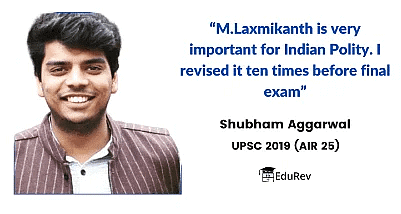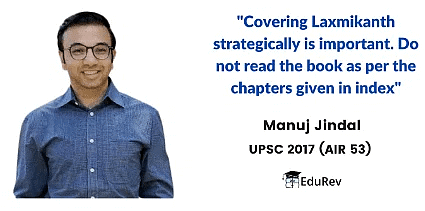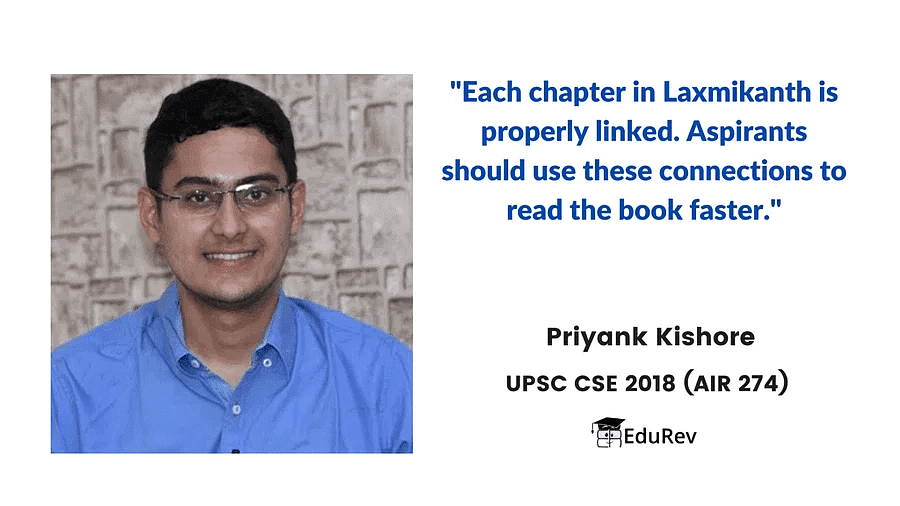How to Read Laxmikant Effectively? - UPSC PDF Download
The Indian Polity is an essential subject for the UPSC Civil Services Examination (CSE). As a part of the General Studies Paper-II, it covers various aspects of the Indian Constitution, political system, governance, and administration. A strong understanding of Indian Polity is crucial for aspirants to score well in the Prelims and Mains examination and to excel in their administrative careers.
Role of Laxmikant in understanding Indian Polity
M. Laxmikant's book "Indian Polity" is considered the bible for UPSC aspirants when it comes to studying Indian Polity. The book's comprehensive coverage, lucid language, and clarity of concepts make it the go-to resource for both beginners and experienced candidates.
Understanding the book's structure
A. Analyzing the table of contents
Before diving into the book, it's essential to understand its structure and organization. The table of contents provides an overview of the chapters and sections, allowing you to identify the key concepts and plan your study schedule accordingly.
B. Identifying the key chapters and sections
Some of the critical chapters in Laxmikant's Indian Polity include Historical Background, Fundamental Rights, Directive Principles, Parliament, Judiciary, and Constitutional Bodies. While every section is essential for a holistic understanding of Indian Polity, focusing on these key chapters will help you gain a strong foundation.
Reading strategies
1. Taking notes and highlighting important points
As you read the book, take notes and highlight essential points, keywords, and case laws. This will help you retain the information better and make revisions quicker and more effective.
2. Understanding the interlinking of chapters
While reading, try to understand the connections between different chapters and concepts. This will help you develop a comprehensive understanding of Indian Polity and score better in the examination.
Focusing on Important Chapters
- Historical Background (Chapter 1)
- Making of the Constitution (Chapter 2)
- Salient Features of the Constitution (Chapter 3)
- Preamble of the Constitution (Chapter 4)
- Union and its Territory (Chapter 5)
- Citizenship (Chapter 6)
- Fundamental Rights (Chapter 7)
- Directive Principles of State Policy (Chapter 8)
- Fundamental Duties (Chapter 9)
- Amendment of the Constitution (Chapter 10)
- Basic Structure of the Constitution (Chapter 11)
- Central Government (Chapters 12-24)
- Parliament (Chapters 25-29)
- State Government (Chapters 30-33)
- 15. State Legislature (Chapters 34-37)
- Union Territories and Special Areas (Chapters 38-40)
- Local Government (Chapters 41-43)
- Constitutional Bodies (Chapters 44-53)
- Non-Constitutional Bodies (Chapters 54-58)
- Other Constitutional Dimensions (Chapters 59-66)
- Political Dynamics (Chapters 67-70)
- Working of the Constitution (Chapter 71)
Revising and practicing regularly

1. Creating short notes and mind maps
Prepare concise notes and mind maps for quick revision, especially for crucial chapters and concepts. This will help you retain the information better and identify gaps in your understanding.
2. Attempting mock tests and previous year questions
Regularly attempt mock tests and solve previous year questions to assess your preparation level and identify areas that need improvement.
Complementing Laxmikant with other resources
A. The Constitution of India - Bare Act
Refer to the original text of the Indian Constitution to get a clear understanding of the provisions and their interpretations.
B. Newspapers and online articles for current affairs
Keep yourself updated with the latest developments in Indian Polity by reading newspapers such as The Hindu, The Indian Express, and online articles.
C. Online video lectures and discussion forums
Supplement your learning with online video lectures and participate in discussion forums to clarify doubts and gain diverse perspectives.
 |
Download the notes
How to Read Laxmikant Effectively?
|
Download as PDF |
Tips and tricks for effective learning
A. Understanding the basics before diving into complex topics
Ensure that you have a strong foundation in the basic concepts before moving on to more complex topics.
B. Relating concepts to real-life examples and case studies
Try to understand the practical implications of the concepts by relating them to real-life examples and case studies. This will make your learning more engaging and help you retain the information better.
C. Discussing and debating with peers and mentors
Engage in discussions and debates with your peers and mentors to gain diverse perspectives and deepen your understanding of Indian Polity.
What can we skip?
- You can skip the Political Dynamics part, it's not required if you just want to study for Prelims. You can come back to it after prelims. But this part will help you to give better understanding, read it if you have enough time , if you do not have enough time just skip the entire part for prelims.
- Appendices is not that important, just the UPSC questions and old papers are important to practice in it.
- List of tables are given in the book, but most of them are not required to study.
Conclusion
A. The importance of dedication and consistency in preparation
Success in UPSC CSE requires dedication and consistency in your preparation. Stay committed to your study schedule and revise regularly to excel in the examination.
B. Balancing the study of Laxmikant with other subjects and resources
While Laxmikant's Indian Polity is a vital resource, remember to balance your preparation by studying other subjects and resources. This will ensure a comprehensive understanding of the UPSC CSE syllabus and maximize your chances of success.























